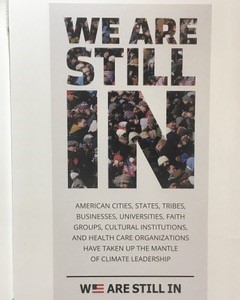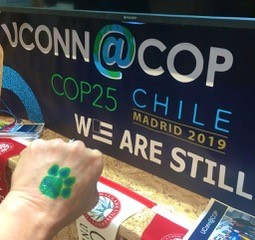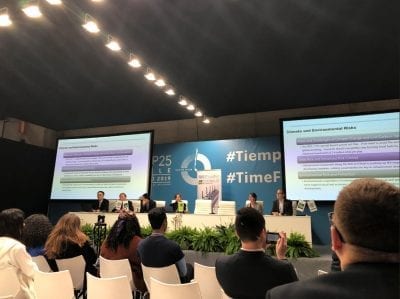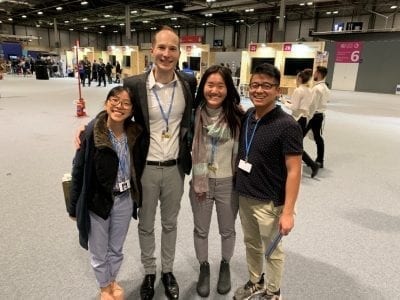Editor’s Note: Too often we discourage individuals from involving emotions in the decision making process. However, our fellows recognized that emotion, empathy, and personal connection is essential and necessary in addressing global issues holistically.
Hope Amongst Devastation: Personal Connection and Youth Involvement – Louanne Cooley
I’m Right, You’re Wrong! A Need for Empathy in the Environmental Movement – Xinyu Lin
The Essence of a Talanoa – Danny Osorio
Hope Amongst Devastation: Personal Connection and Youth Involvement
Louanne Cooley – JD School of Law
On our last day in Madrid for COP25, my body and mind are still battling out which gets to be in charge. The mind has mostly won this week allowing me to function on intermittent sleep and questionable food choices, but still be able to listen intently and speak more or less coherently. However, by yesterday, it was mostly a matter of running on coffee and enthusiasm. My body finally gave up and said, “Treat me like this and I’ll make you sorry,” and I spent the last 24 hours losing a fight against a cold. Basic epidemiology suggested that putting 25,000 people from 200 countries together was bound to make viruses very happy, and most of us have succumbed in one way or another.

Humanity is a cooperative, communal species. The energy here at COP25 is also infectious. Learning how others cope with climate change is simultaneously heartening and devastating. In the US, our most pressing issue is convincing people this is “real”; but in central Africa, people are dying from the combined effects of drought, malnutrition, disease and lack of resources exacerbated by climate change. Indigenous cultures world-wide are feeling the pressure of environmental degradation and loss of cultural knowledge. Island nations are losing land to sea level rise and seeing shifts in ocean ecology at unprecedented rates.
Early in the week, I sat in on several talks dealing with ‘loss and damage’. The concept is that wealthier countries historically responsible for industrialization and carbon inputs that drive climate change are responsible for assisting in offsetting the costs borne by vulnerable nations, essential recognizing their humanitarian obligations with financial assistance. As you can bet, this isn’t popular with developed nations and working out just who is responsible for what, for how long, and how much is the source of intense debate. Loss and damage arguments also highlight how interconnected issues of human rights, poverty, debt financing, international aid are with climate change.
The last two days of COP25 for me have mostly been about making personal connections. I spoke with a delegate from Uganda who works in the finance ministry and told me about the difficulty in maintaining the enthusiasm and energy to address climate concerns outside of the time spent at COP. Smaller nations with aligned interests can often effectually form voting coalitions to amplify their voice, but it is difficult to remain in contact during the rest of the year when much of their time and resources are spent responding to pressing immediate crises. This was echoed by delegates from Zambia and Fiji.
I also spent time talking youth activists like Adam Currie of Generation Zero which pushed for the recent adoption of the Zero Carbon Act in New Zealand.

Harnessing the energy and enthusiasm of youth to lead civil activism to hold government responsible for climate action is imperative if we have any chance of meeting targets to limit emissions.
Last night many of our students attended the climate march in Madrid. It felt like the entire city was on the move, out to show support, be present, make their voice heard. There is still so much to do, and as we’ve learned from watching the negotiations, it happens slowly and incrementally. At a time when we are truly out of time, this is frustrating and exacerbating. But for lasting change to happen, but processes need to work in tandem: civil action and protest to highlight the issues and push governmental action, and the work of scientists and negotiators to building up long term data and translate that into robust, well thought out political frameworks.
This week has been devastating and hopeful. Devastating to hear the voices of those most vulnerable and affected, and hopeful that civil action, led by youth and supported by decades of dedicated work, can lead to real change.
I’m Right, You’re Wrong! A Need for Empathy in the Environmental Movement
Xinyu Lin – B.S. Civil Engineering
Armed with heavy skepticism, I sat down for a joint panel titled “Ecological Protection and Renewable Energy Transition in the Belt & Road” hosted by researchers from China and representatives from the organization Peace Boat on the second day of COP. While I listened to details on China’s Green Belt & Road Initiative and a “sustainable” cruise boat, I took note of any questionable conclusions or potential greenwashing. At the end of the panel, I marched up to the front and began my quest to expose gaps in judg ement that were made in both projects.

I ended up having a fantastic conversation with a representative from Peace Boat. We disagreed on certain approaches to solving the climate crisis, but we connected as people just trying to improve the world to the best of our abilities. He became a familiar face throughout the rest of my time at COP as I ran into him every day following the panel. My interactions with him reminded me that as my opinions have become stronger, so has my intolerance for bystanders and imperfect activism. I had forgotten the importance in understanding others — not just individuals most heavily affected by these problems, but also individuals that might even be impeding change.

We’re drawn towards those that share our opinions. Within the environmental movement, it’s easy to find voices that echo our own trains of thought and to villainize those that don’t seem to get the basic ideas that underlie climate activism. Yet what good does it do to stay within our circles, preaching change to those who already agree with us?
In the urgency to tackle our climate emergency, we’re leaving behind patience and understanding. We can’t change minds without empathizing with them first.Yes, we certainly need to hold people accountable, but we also need the ability to collaborate effectively with people from other perspectives.
Amidst the urgency of the situation, we need to constantly remind ourselves why we care and what we’re fighting for — our communities, our connection, our ability to love, and our hope.
The Essence of a Talanoa
Danny Osorio – B.S. Molecular and Cellular Biology and Marine Sciences

I come from the Pacific coast of a country in South America and I would have never thought of participating in the honor of a Talanoa Dialogue. Despite the limitations of how panels at COP25 work and how it could not really be a proper dialogue, I still feel happy I got to share part of my experiences and stories of how climate change has affected lives directly and indirectly.
In many of our Pasifika cultures, it is all about storytelling, or telling our story to make the connections. I met some Samoan delegates and the first thing they asked me was for my name and surname, and then they started making the connections.
They asked for my father’s name and I saw them thinking — they were coming with questions that I did not have the answers for. They would ask, “Is your grandfather from…?” or “Is your mother’s family from…?”
I didn’t know the answers but this is how they connect. This is where relationships are built and how the story goes on. The Talanoa Dialogue is an element of the COP that nurtures and helps continue this story telling, in the context of climate change.
The word ‘talanoa’ is a term meaning to talk or speak. The four elements around the word ‘talanoa’ are attributes that make the talanoa more meaningful and rich: Ofa/Love, Mafana/Warmth, Malie/Humour, Faka’apa’apa/Respect.
I don’t know if we necessarily fulfilled all of these requirements in the panel where I was a participant, but we certainly did when I was talking with other young representatives who were advocating for the voices of the ocean.